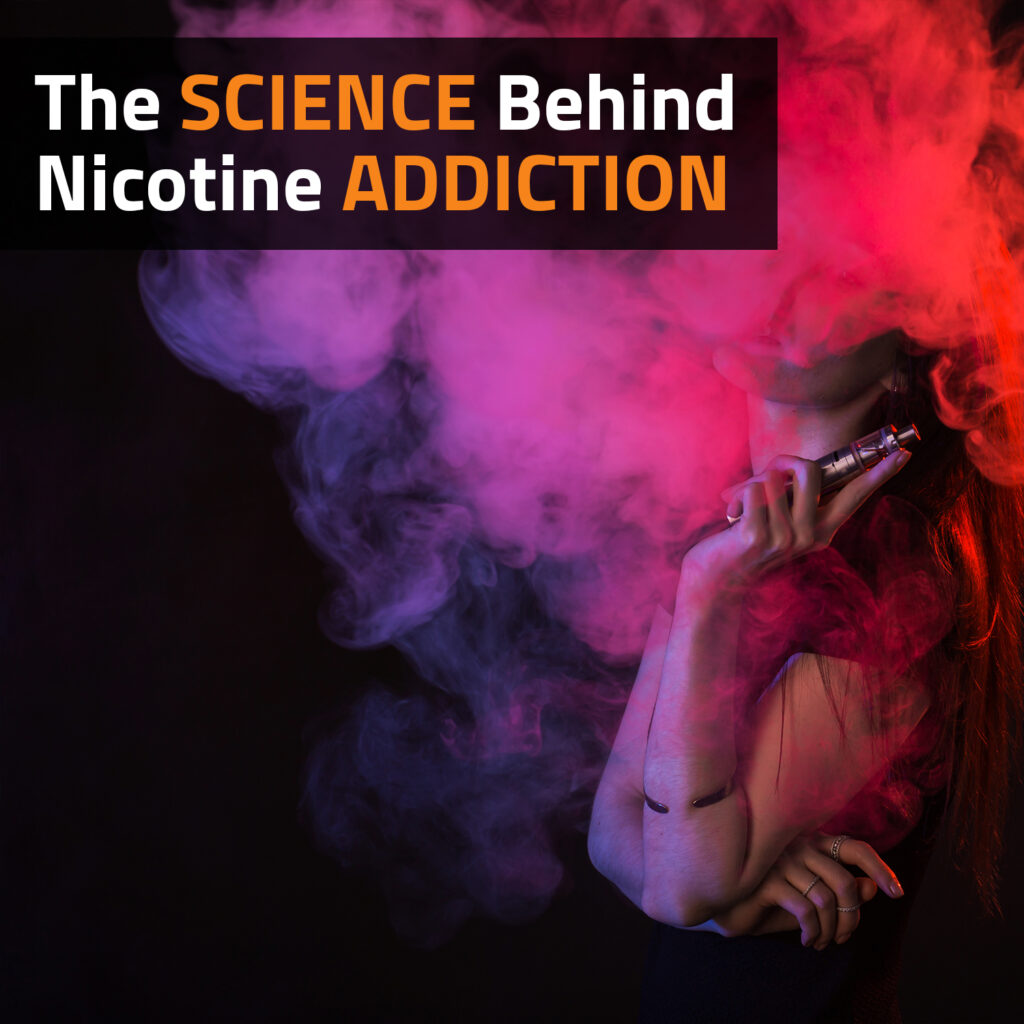Nicotine, the primary addictive component in tobacco, has been at the heart of public health discussions for decades. It’s the reason many find it so difficult to quit smoking or using other tobacco products. But why is nicotine so addictive? What happens in the brain and body to make quitting such a challenge? Understanding the science behind nicotine addiction can shed light on its powerful grip and offer insight on effective quitting strategies.
How Nicotine Works: A Journey Through The Brain’s Systems
When you inhale nicotine, it enters the bloodstream through the lungs and quickly travels to the brain, reaching it in just 10 to 20 seconds. Once there, nicotine interacts with receptors in the brain called nicotinic acetylcholine receptors (nAChRs). These receptors are part of the brain’s reward system and are naturally activated by acetylcholine, a neurotransmitter responsible for memory, attention, and muscle activation.
Nicotine mimics acetylcholine but has a far more intense and prolonged effect. It stimulates the release of dopamine, the “feel-good” chemical, which creates a sense of pleasure and reward. This dopamine release reinforces the behavior of smoking or vaping, making the user more likely to repeat it.
Over time, the brain adapts to the presence of nicotine by producing more receptors and altering the balance of neurotransmitters. This adaptation leads to dependence, where the brain relies on nicotine to maintain normal function.
Physical And Psychological Dimensions Of Nicotine Addiction
Nicotine addiction is both physical and psychological, making it a particularly challenging habit to break.
Physical Addiction
The physical aspect of addiction stems from nicotine’s direct effects on the brain’s reward system. The changes in neurotransmitter activity create cravings and withdrawal symptoms when nicotine levels drop. These symptoms can include:
- Irritability
- Anxiety
- Difficulty concentrating
- Increased appetite
- Restlessness
Psychological Addiction
Psychological addiction arises from the habits and routines associated with nicotine use. For example, smokers often associate certain activities, like drinking coffee or socialising, with smoking. These associations become deeply ingrained, making it difficult to separate the behaviour from the substance.
Why Is Nicotine So Addictive?
Nicotine’s addictive potential is a result of its unique properties and how it interacts with the brain and body:
- Rapid absorption: Nicotine reaches the brain incredibly quickly, providing almost instant gratification. This rapid absorption reinforces the behavior, as the user experiences immediate relief or pleasure.
- Short half-life: Nicotine has a short half-life of about two hours, meaning its effects wear off quickly. This creates a cycle of repeated use to maintain nicotine levels and avoid withdrawal symptoms.
- Dopamine surges: The dopamine release triggered by nicotine is a significant driver of addiction. It creates a strong association between nicotine use and feelings of pleasure, reinforcing the habit.
- Tolerance and dependence: With continued use, the brain develops tolerance to nicotine, requiring higher doses to achieve the same effects. This tolerance leads to dependence, where the absence of nicotine causes discomfort and cravings.
Nicotine Delivery Methods: Cigarettes, Vapes, And More
The way nicotine is delivered can influence its addictive potential.
Cigarettes
Traditional cigarettes are designed to deliver nicotine rapidly through inhalation. The combination of nicotine and other chemicals in tobacco enhances its addictive properties.
Vaping
Vaping devices also deliver nicotine quickly but with fewer harmful chemicals than cigarettes.
Other Forms
Nicotine can also be consumed through smokeless tobacco, nicotine gum, nicotine pouches, and nicotine patches. These methods differ in their absorption rates, with slower delivery methods generally being less addictive.
The Role Of Genetics In Nicotine Addiction
Not everyone who uses nicotine becomes addicted, and genetics play a significant role in determining susceptibility. Some individuals have genetic variations that affect how they metabolise nicotine, how sensitive their brain is to dopamine, or how they experience withdrawal symptoms.
For instance, people with a slower nicotine metabolism may experience its effects for longer, reducing the need for frequent use. Conversely, fast metabolisers may find themselves using nicotine more often to maintain its effects, increasing the risk of addiction.
The Challenges Of Quitting Nicotine
Quitting nicotine is notoriously difficult, with many users requiring multiple attempts before successfully stopping. The combination of physical cravings, psychological triggers, and withdrawal symptoms can make the process overwhelming.
Withdrawal Symptoms
When a person stops using nicotine, their brain and body must adjust to functioning without it. This adjustment period can be uncomfortable, with symptoms peaking within the first few days and gradually subsiding over weeks or months.
Triggers And Relapse
Psychological triggers, such as stress or certain environments, can lead to relapse. Even after physical dependence has diminished, the psychological aspect of addiction can persist for years.
Treatment Options For Nicotine Addiction
Overcoming nicotine addiction often requires a multi-faceted approach:
- Nicotine replacement therapy (NRT): Products like nicotine gum, pouches, patches, lozenges, and inhalers provide a controlled dose of nicotine, reducing withdrawal symptoms and cravings.
- Prescription medications: Drugs like varenicline and bupropion can help reduce cravings and withdrawal symptoms by altering brain chemistry.
- Behavioral therapy: Cognitive-behavioral therapy (CBT) and other counseling methods can help individuals identify triggers, develop coping strategies, and build healthier habits.
- Support groups: Programs like Nicotine Anonymous and online forums provide a sense of community and accountability, which can be crucial for long-term success.
The Long-Term Benefits Of Quitting
While quitting nicotine can be challenging, the benefits are profound:
- Improved health: Reduced risk of heart disease, lung disease, and other smoking-related illnesses.
- Enhanced quality of life: Better taste and smell, increased energy, and improved respiratory function.
- Financial savings: Eliminating the cost of cigarettes or vaping supplies can save thousands annually.
Nicotine addiction is a complex interplay of biology, psychology, and environment. Its rapid effects on the brain’s reward system and the ingrained habits surrounding its use make it one of the most challenging addictions to overcome.
However, understanding the science behind nicotine addiction empowers individuals to break free. With the right combination of tools, support, and determination, quitting nicotine is entirely achievable. Whether through gradual reduction, behavioral therapy, or nicotine replacement products, every step toward quitting is a step toward better health and well-being.
For those still on their journey, it is important to remember that relapse is not failure – it is part of the process. Each attempt brings valuable lessons and moves you closer to a nicotine-free life.









